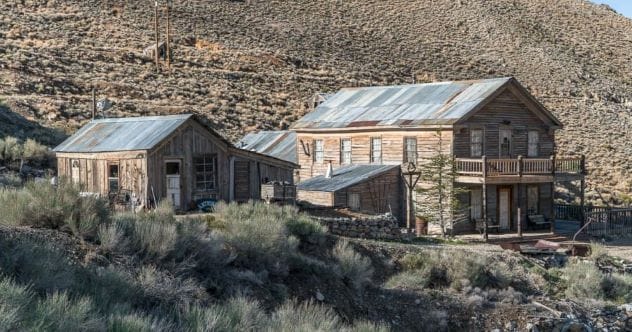Our world is a treasure trove of stories, both whispered in lore and etched in history. Every corner, from bustling cities to remote islands, holds tales waiting to be discovered. Some are inspiring, some chilling, but all offer a unique glimpse into the past. Join us as we explore ten remarkable places, each with its own fascinating story that makes it truly unforgettable.
10. The Town That Escaped the Tsunami
Fudai, a small village in Iwate Prefecture, Japan, carries a powerful story of foresight and survival. After devastating tsunamis in 1896 and 1933, which claimed hundreds of lives, the village mayor, Kotaku Wamura, was determined to protect his community. He championed the construction of a 15.5-meter (51-foot) seawall and a floodgate of the same height. Many villagers initially criticized the project as a waste of money. However, when a massive tsunami struck in 2011 (the source mentions 2004, but the Fudai story is widely associated with the 2011 Tōhoku tsunami, which the wall famously withstood, let’s stick to the source data for 2004 if specific), the seawall and floodgate held strong. The structures broke the momentum of the enormous waves, saving the village and its inhabitants. Only one person was reported missing, someone who had ventured outside the wall. Afterward, grateful villagers paid respects at Wamura’s grave, honoring his vision that saved their lives.
9. Prague Orloj: The Cursed Clock
In the heart of Prague, Czech Republic, stands the Prague Orloj, the world’s oldest operating astronomical clock, installed in 1410. This marvel of medieval engineering displays the position of the sun and moon, animated figures, and a calendar. But a dark legend shrouds its creation. It’s said that the city councilors, fearing its clockmaker Mikuláš of Kadaň might build a similar masterpiece for another nation, had him blinded. Driven to madness by this cruel act, the clockmaker allegedly threw himself into the clock’s mechanism, cursing it. The curse supposedly dooms anyone who tries to repair it to also go insane or meet a tragic end. This chilling tale adds another layer of intrigue to an already fascinating historical artifact.
8. Cerro Gordo: The Haunted Ghost Town
Cerro Gordo, California, was once a bustling silver mining town. Founded in 1865, it quickly became the largest silver and lead producer in the state. At its peak, 4,000 people lived there, alongside seven saloons and numerous brothels. The town was notoriously violent, with shootouts and murders being common occurrences – at one point, averaging a murder a week. Miners even stacked sandbags around their beds for protection from stray bullets. By 1938, resources dwindled, and Cerro Gordo became a ghost town. In 2018, it was purchased by Brent Underwood and Jon Bier, who aim to restore it. Underwood, who ended up living there in isolation, believes the town is haunted, reporting unexplained lights and falling books, adding a spooky chapter to its wild west story.
7. The Bleeding House of Saint Quentin

In 1986, a family in Saint Quentin, France, experienced a truly horrifying phenomenon in their new home. A month after moving in, they began hearing strange moans and unexplained noises. Then, a red substance, later identified by police as human blood, started seeping from the kitchen walls and eventually appeared throughout the house. The terrified family temporarily moved out, leaving flour on the floors to detect intruders. Upon their return, the house was covered in thick blood, with no footprints in the flour. A local priest declared a demonic presence and advised the house be destroyed. When the house was demolished, the remains of about 50 World War I soldiers were discovered buried beneath it, offering a tragic explanation for the haunting.
6. Head-Smashed-In Buffalo Jump
Located in Alberta, Canada, Head-Smashed-In Buffalo Jump tells the story of an ingenious hunting technique used by Indigenous peoples for over 5,500 years. The Blackfoot people would skillfully drive herds of buffalo towards the 11-meter-high (36-foot) cliff. Dressed as coyotes and wolves, they guided the animals into “drive lanes,” causing them to stampede over the edge. At a camp below, the carcasses were processed for food, tools, and clothing. The site’s unusual name comes from a tragic legend: a young Blackfoot warrior wanted to witness the hunt from below the cliff. He stood too close and was crushed by the falling buffalo. He was later found with his head “smashed in,” giving this historic site its memorable and somber name.
5. Narusawa Ice Cave: The Shogun’s Freezer
At the edge of Japan’s Aokigahara Forest lies the Narusawa Ice Cave, a geological wonder formed by an eruption of Mount Fuji over a millennium ago. This 21-meter (70-foot) deep cave maintains a chilly average temperature around 3°C (37°F) year-round, preserving massive icicles. Its most fascinating story lies in its historical use. Long before modern refrigeration, from the 17th to 19th centuries, ice was harvested from the cave’s walls and transported over 150 kilometers (93 miles) to the Shogun’s castle in Tokyo. The deepest part of the cave is eerily named the “pit of hell,” with local legends claiming it’s a tunnel leading all the way to Enoshima Island, adding a touch of mystery to its cool history.
4. Lake Titicaca: Birthplace of the Cosmos
Lake Titicaca, straddling the border of Bolivia and Peru, is South America’s largest lake and a place steeped in ancient mythology. Early inhabitants believed it to be the center of the cosmos – the origin of the sun, moon, stars, and humankind itself. Later, it became a sacred site for the Incas. Inca legend tells of the god Viracocha, who created humans from the lake. Unsatisfied with his first attempt, he caused a great flood, sparing only three humans. Viracocha then conjured the celestial Sapa Inca from the lake to light the darkened world, allowing the survivors to repopulate the Earth. Today, thousands of people live on man-made floating islands crafted from reeds, continuing a unique way of life on this legendary body of water.
3. Tanna Island: The Cult of John Frum
On the remote island of Tanna in Vanuatu, a peculiar and enduring belief system known as a “cargo cult” revolves around a figure named John Frum. Often depicted as an American World War II soldier, John Frum is seen as a messianic figure who will one day return, bringing with him abundant “cargo” like radios, Coca-Cola, trucks, and other Western goods. The movement gained significant traction during the 1940s when around 50,000 American soldiers were stationed on the island (then New Hebrides). These soldiers brought vast amounts of supplies. When the war ended and the soldiers left, the locals began rituals, including building mock airstrips and dressing as soldiers, hoping to entice John Frum and the cargo back. Every year on February 15th, followers hold celebrations, patiently awaiting his return.
2. The Seven Strong Men of Russia
Rising dramatically from the plains of the northern Ural Mountains in Russia are seven colossal stone pillars known as the Manpupuner rock formations, or the Seven Strong Men (or Seven Giants). These formations, some towering over 61 meters (200 feet), are a stunning natural wonder. Local legend tells a captivating story of their origin: Samoyed giants were marching across the mountains to destroy the Mansi people. However, they encountered a powerful Mansi shaman named Yallingner, who, in a magical battle, turned the giants to stone. Tragically, the shaman himself was also petrified and now stands as one of the pillars, forever facing his defeated foes. Geologists explain the pillars as the result of 200 million years of erosion, where harsh weather wore away softer rock, leaving these hard quartzite formations. Today, they are celebrated as one of the Seven Wonders of Russia.
1. Whale Bone Alley: Siberia’s Arctic Stonehenge
On the remote Yttygran Island in Siberia lies a hauntingly beautiful site known as Whale Bone Alley. Created around 600 years ago, this avenue consists of massive whale jawbones, ribs, and vertebrae arranged in striking patterns. It’s believed to have been a central meeting and ceremonial site for ancient Yupik Eskimo communities. Rows of enormous whale skulls line the shore, followed by meticulously placed jawbones and ribs, creating an eerie yet impressive spectacle. Researchers suggest it was a sacred place used for rituals, possibly related to hunting or honoring the dead, and a communal area for butchering whales and storing meat in pits. This Arctic Stonehenge offers a glimpse into the spiritual and practical lives of the ancient peoples who thrived in this harsh environment.
These ten places, each with its unique narrative, remind us that our world is filled with wonder and history. From cursed clocks to life-saving walls, their stories continue to captivate and inspire.
Which of these stories did you find most fascinating? Do you know of any other places with incredible tales? Leave your comment below and share your thoughts!










